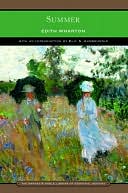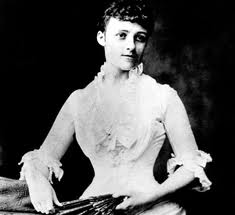“[The mountain] is where I was born…where I belong.”
Written in 1917, Sum mer is Wharton’s most explicitly sexual novel, tracing the awakening of Charity Royall to the sweetness of love and its power. Charity was born on “the mountain,” a place of poverty and degradation, and given over to be brought up by Lawyer Royall and his wife, residents of the town of North Dormer. When his wife dies, Lawyer Royall is hard pressed to deal with this child, choosing to ignore her most of the time, and bringing her up with little feeling, warmth, or affection.
mer is Wharton’s most explicitly sexual novel, tracing the awakening of Charity Royall to the sweetness of love and its power. Charity was born on “the mountain,” a place of poverty and degradation, and given over to be brought up by Lawyer Royall and his wife, residents of the town of North Dormer. When his wife dies, Lawyer Royall is hard pressed to deal with this child, choosing to ignore her most of the time, and bringing her up with little feeling, warmth, or affection.
Anxious to have some independence so that she can escape, at some point, from the closed society of the village, Charity becomes the town librarian, a part-time job which gives her a small amount of her own money. There she encounters Lucius Harney, the nephew of one of the town’s leading citizens, an architect studying some of the old houses in the area. His interest in Charity soon develops into affection and then passion, and the two become lovers, a relationship which quickly develops complications. Charity, with few options in life, is starved for affection and yearns to escape the village, while Harney, educated but personally weak, can already come and go as he pleases.
 Wharton uses the seasons symbolically to illustrate the development of the relationship between Charity Royall and Lucius Harney from the earliest stirrings of their interest when they meet in early June to the full passion of their love in mid-August. Fall brings reality to Charity, and winter freezes her soul. Throughout the novel references are made to the mountain where Charity was born and to the ignorant people who live there without hope of improving their lives. Charity’s own return to visit her family shows her the desperation of their lives, and her need to grasp whatever escape route is available to her.
Wharton uses the seasons symbolically to illustrate the development of the relationship between Charity Royall and Lucius Harney from the earliest stirrings of their interest when they meet in early June to the full passion of their love in mid-August. Fall brings reality to Charity, and winter freezes her soul. Throughout the novel references are made to the mountain where Charity was born and to the ignorant people who live there without hope of improving their lives. Charity’s own return to visit her family shows her the desperation of their lives, and her need to grasp whatever escape route is available to her.
Wharton’s bold depiction of sexual themes makes this novel unusual for its period. She depicts a young woman who has a fierce desire for independence but who has few opportunities to escape her environment, a young woman who latches onto a relationship which broadens her world. She minces no words in showing scenes in which sexual abuse rears its ugly head, and she is realistic in the options she gives for “fallen” women like Charity to deal with the complications of their lives in the “fall” of the relationship. Though the beginning of the novel may seem sentimental or melodramatic, Wharton has a clear vision of the limited possibilities open to young women of the day, and her conclusion emphasizes this.
Notes: The author’s photo appears on http://theboweryboys.blogspot.com
Also reviewed here: THE HOUSE OF MIRTH, GLIMPSES OF THE MOON, and AGE OF INNOCENCE
